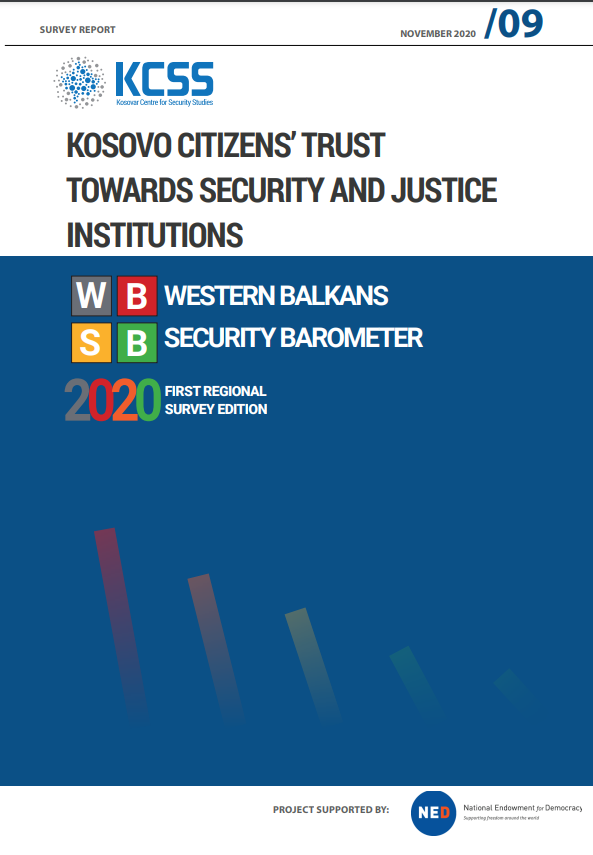1/11/2020

Kosovar Center for Security Studies (KCSS)
NED
Shpat Balaj
The tenth edition of the Kosovo Security Barometer, respectively the first edition of the Western Balkans Security Barometer, consists of three main chapters:
1. Citizens’ trust towards Security, Justice and Central Institutions;
2. Citizens’ perceptions on the corruption of the key institutions;
3. Frequency of citizens’ contact with key security and justice institutions.
While this report provides a general overview of citizens' perceptions on the above-mentioned chapters, it also presents the data based on Gender, Region, Area (Urban/Rural), Age (18-35/36+) and Ethnicity of the respondents. In addition, the report offers additional analysis on why such citizens’ perception towards the issues provided in the report are present. This was enabled by conducting two focus groups with field researchers - who provided first-hand information from the field in addition to the fixed responses of the citizens’ and two focus groups with representatives of institutions and other stakeholders that are subject of KSB analysis - who provided their perspective on why such perceptions are present and offered potential solutions on how to further the citizens' perception towards them.
The Key Findings of the tenth edition of the KSB are as follow:
* Respondents of Kosovo Security Barometer continue to have higher trust towards Security institutions compared to Central and Justice institutions;
* The Kosovo Security Force continues to be the most trusted institution with 81 percent of respondents having trust or complete trust in them;
* Kosovo Intelligence Agency, Kosovo Customs and Kosovo Correctional Service are the least trusted security institutions;
* In general, Security institutions are perceived as less corrupted by citizens compared to Justice and Central institutions;
* Justice institutions, namely the Courts and the Prosecution, continue to be perceived as corrupted by over 40 percent of respondents believing that these institutions are corrupted or very corrupted;
* The Government of Kosovo is considered the most corrupted institution with 72 percent respondents stating that the Government is corrupted or very corrupted;
* In general, citizens have a low frequency of direct contact with the institutions in Kosovo;
* The institutions with which the citizens have had more direct contact in the last 12 months are the Municipalities;
* The institution with which the citizens have had the least direct contact in the last 12 months is the Government;
* This report is published in the framework of the regional project "Western Balkans Security Baroemter - Promoting Accountability in Security and Justice Institutions" supported by the National Endowment for Democracy (NED).
**Perceptions presented in this report are a summary of information gathered from respondents and it only demonstrates how people percept institutions. It is in no way a conclusive assessment of the quality of the work of institutions subject to this study. It shall serve as an instrument to them for addressing potential shortcomings but also an indicator of the effectiveness of their communication with the people.
**The views presented in this report are perceptions of the respondents and do not necessarily represent the views of the Kosovar Centre for Security Studies. Opinions expressed in this report do not necessarily represent the views of the National Endowment for Democracy (NED).